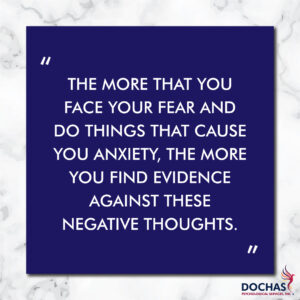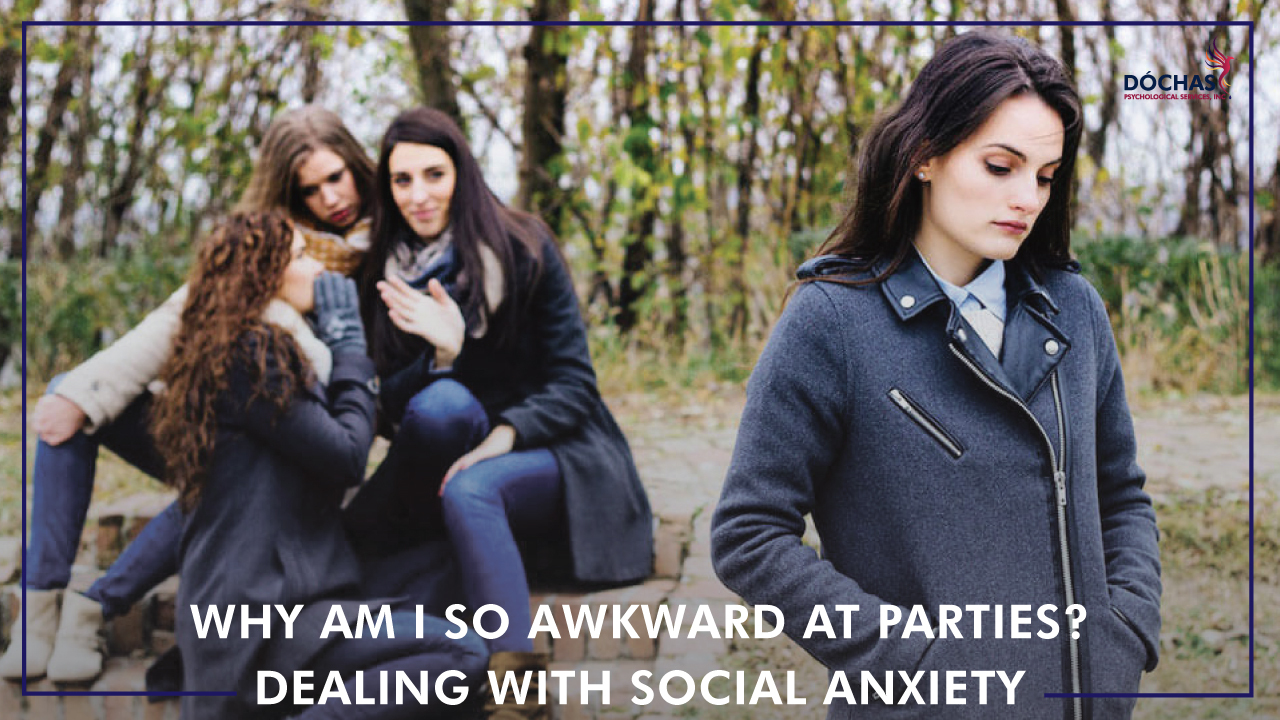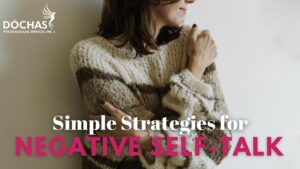When you think of parties, do you think of a fun time catching up with friends, or do you think of an awkward evening standing with your back against the wall, unsure of where to put your hands? If it’s the second, you’re not alone—many of us feel awkward at parties or other social situations. Today it’s Justine here on the Dóchas blog, and I’m going to talk about that feeling of being awkward at parties, and give some tips for dealing with social anxiety.
With the easing of pandemic restrictions and warmer weather approaching, there seems to be more and more social engagements. This can cause anxiety for those of us who are socially anxious. These commitments can be exciting and energizing for many people, but those with social anxiety who re-energize by spending time alone may find the inflow of invites to spring BBQs, family gatherings, brunches with friends, or other events daunting.
Check out our previous post on the blog about handling socializing as an introvert during the holiday season for more information about social anxiety.
Symptoms of Social Anxiety:
What does social anxiety feel like? Symptoms include both physical and psychological symptoms (your thoughts and feelings). Physical symptoms include increased heart rate, sweating hands, blushing, nausea, and dizziness.
Thoughts that might come into your mind while experiencing social anxiety might sound like “I’m going to say something stupid,” “everyone will laugh at me,” or “I won’t be able to carry on a conversation.” These thoughts are often accompanied by feelings of fear, embarrassment, or shame.
This can feel embarrassing, and it may feel natural to attempt to hide and manage these symptoms by avoiding social events or using safety behaviours. Safety behaviours include those behaviours which provide temporary relief of fear and anxiety and can include things like looking at your phone when you feel awkward in a group.
Tips to Deal with Social Anxiety
So how can you cope with your social anxiety so you can face those scary parties?
Monitor and Recognize, Rather than Distract
One strategy is to monitor and recognize your thoughts and emotions. Rather than trying to distract from your discomfort, acknowledge your fear and anxiety instead, and use coping skills to self-regulate these feelings.
For example, you could try applied relaxation techniques such as guided imagery, breathing exercises, and meditation to manage these negative thoughts and emotions. These techniques can do wonders for calming our nervous system and reducing physical and emotional symptoms of anxiety. For you, this could involve retrieving a happy memory. Can you imagine yourself there? Maybe you can remember the sound of the waves on the beach and the feeling of the sand in your toes as you practice your breathing and slowly release your anxiety-provoking thoughts.
Put Your Thoughts on Trial
Another strategy is to write down your thoughts and put them on “trial.” Your thoughts have a direct impact on how you feel, and in turn, how you behave. In this case, if you always believe that your negative thoughts are true, you’re going to feel pretty bad.
However, thoughts are often just that—thoughts and not facts. You can train your brain to be more critical of the thoughts you experience and in turn of how you feel and behave. Here’s an example of how you can look at our thoughts in a more logical way:
Say you notice and write down an anxiety-provoking thought such as, “I’m going to say something stupid, and someone will laugh at me.” What evidence do you have that suggests that this thought is accurate? You then write down the evidence against this thought. For example, “There’s been plenty of times where I held a conversation with someone new just fine,” or, “I can’t recall of a time where I embarrassed myself” …you get the idea. Challenge these thoughts instead of accepting them as true.
Monitor and Reduce Your Use of “Safety Behaviours”
The next strategy is to monitor your use of safety behaviours and try to reduce them. For example, you might find yourself avoiding people at parties by leaving the crowd to head outside, or scrolling on your phone so that no one will talk to you, or changing the subject right away when someone asks questions about you to avoid being the centre of attention. When you notice this, try to resist the urge to use these behaviours as they only maintain and strengthen your anxiety over the long term.
The most effective tip in reducing anxiety is this: face your fears head-on. This may be daunting at first, but avoidance behaviours only reinforce your anxiety because they prevent you from gaining evidence that disproves your negative beliefs about how you perform in social situations. (See this link for more information about avoidance behaviours). On the other hand, the more that you face your fear and do things that cause you anxiety, the more you find evidence against these negative thoughts. And this will increase your ability to manage anxiety and navigate social situations!

I hope these three strategies help you the next time you’re invited to a party or other event. Your feelings of being awkward at parties might not disappear overnight, but with these tools you can feel more equipped to understand and manage your thoughts and feeling around your social connections. Take it one step at a time, try some of these strategies, and see if they work for you.
And if you’d like a helping hand to guide you through your social anxiety, reach out to us here at Dóchas Psychological Services. You can call us at 780 446 0300 or contact us by email at info@dochaspsych.com, and one of us would be happy to speak with you.
About Dóchas Psychological
Dóchas Psychological Services is a well-established and trusted therapy clinic located in Spruce Grove, Alberta. At Dóchas we value the idea that everyone deserves a safe space. Through connection and education, our team works hard to build a trustworthy relationship with each of our clients. It is our goal to create a community for our clients to feel like they belong.
Disclaimer
Information provided through Dóchas Psychological Services blogs or vlogs is meant for educational purposes only. They are NOT medical or mental health advice. You can read more about our disclaimer here.










